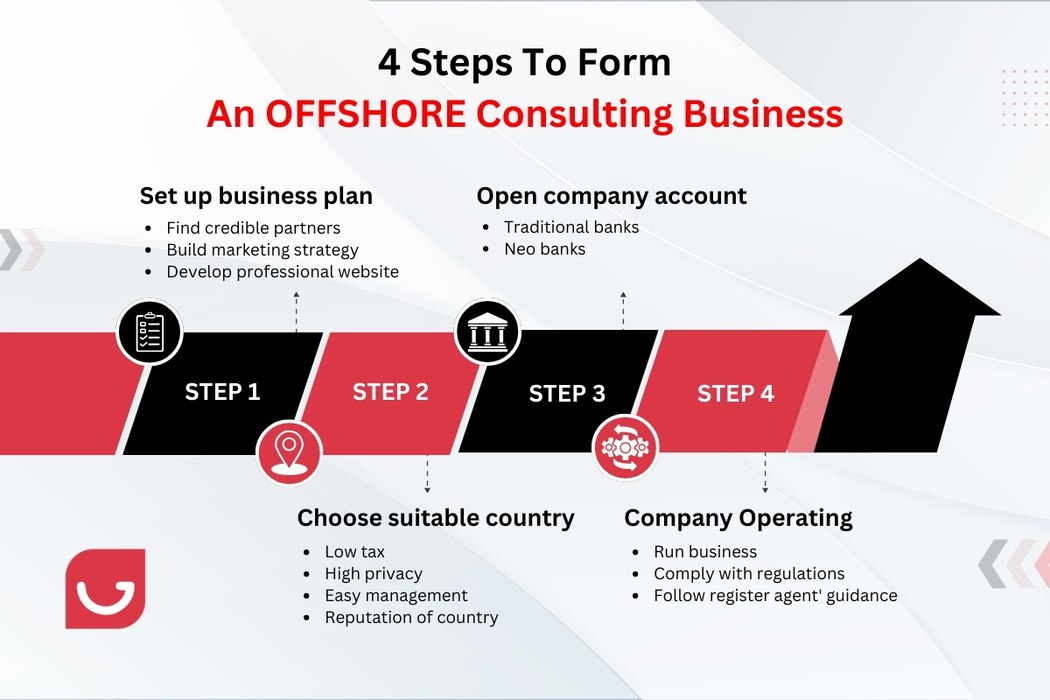How Offshore Company Formations Provide Regulatory Safety and Flexibility
Wiki Article
Understanding Offshore Company Formations: A Comprehensive Overview to the Refine and Benefits
Offshore business formations offer a tactical avenue for business owners looking for to optimize their organization operations. These entities typically provide advantages such as tax obligation benefits, raised privacy, and durable property defense. Nevertheless, understanding the details of selecting a territory, the formation process, and conformity needs is essential. As the landscape of worldwide company evolves, the ramifications of developing an offshore business warrant cautious factor to consider. What steps should one require to navigate this facility terrain?What Is an Offshore Business?
An overseas company is a company entity integrated outside the jurisdiction of its proprietors' house, typically in a country with positive regulatory and tax environments. These firms can serve various objectives, consisting of asset protection, international trading, and wide range monitoring. They are generally established in jurisdictions referred to as tax places, where corporate tax rates are nonexistent or low, and privacy laws are strict.Offshore business might be had by people or other company entities and can run in numerous sectors, including finance, e-commerce, and consulting. While they use particular benefits, the legal and governing frameworks regulating offshore companies vary substantially by jurisdiction. Local business owner must browse these intricacies to ensure compliance with both neighborhood and global legislations. Comprehending the structure and feature of offshore companies is vital for individuals considering this option for organization procedures or asset management.
Advantages of Creating an Offshore Firm
While the choice to create an offshore business may originate from different calculated considerations, the prospective advantages are compelling for several local business owner. One considerable advantage is tax obligation optimization; numerous offshore territories use favorable tax rates or also tax exceptions, enabling firms to maintain more revenues. In addition, offshore firms frequently give improved personal privacy security, securing the identities of shareholders and supervisors from public scrutiny.
Finally, company owner may locate operational adaptability, as offshore territories often have less governing obstacles, making it possible for streamlined monitoring and governance. Jointly, these advantages make offshore business formations an attractive choice for many seeking to increase their business perspectives.
Picking the Right Jurisdiction
Choosing the proper territory for an offshore business is a vital action in optimizing the advantages laid out earlier. Numerous factors affect this decision, consisting of tax obligation laws, company legislations, and the total company setting. Territories such as the British Virgin Islands, Cayman Islands, and Singapore are commonly preferred for their beneficial tax obligation regimes and durable legal structures.It is necessary to think about the particular requirements of business, such as personal privacy needs and governing conformity. Furthermore, the simplicity of operating, including the effectiveness of firm enrollment and financial facilities, plays a considerable function.
Possible proprietors should likewise examine the political security and online reputation of the picked territory, as these components can influence long-term success. Ultimately, extensive study and specialist assessment are advised to assure alignment with the firm's goals and to leverage the full capacity of offshore advantages.

The Offshore Business Development Process
The overseas firm formation process involves a series of vital actions that require cautious planning and implementation. Initially, services or individuals must select a suitable territory that straightens with their goals, thinking about variables such as tax obligation benefits, privacy, and regulatory environment. Following this, the next action entails picking the suitable organization framework, such as an International Organization Business (IBC) or Limited Responsibility Company (LLC)As soon as the framework is determined, needed files, consisting of a service plan, identification, and proof of address, should be prepared. Engaging a credible local agent or company can streamline this phase, ensuring compliance with neighborhood guidelines. After submitting the called for documents to the pertinent authorities, the development procedure typically finishes in the issuance of a certificate of incorporation. This file develops the business as a lawful entity, enabling it to perform company worldwide.
Lawful Needs and Conformity
Recognizing the legal requirements and compliance responsibilities is crucial for any individual seeking to develop an overseas firm. Each jurisdiction has particular policies that need to be complied with, which can consist of company registration, acquiring required licenses, and preserving local addresses. Offshore Company Formations. It is essential to assign a signed up representative that can facilitate communication with local authorities and guarantee compliance with recurring reporting requirementsAdditionally, lots of jurisdictions need the submission of yearly economic statements, in addition to tax filings, even if the company does not produce revenue. Investors and supervisors should be recognized, with due persistance treatments typically mandated to confirm their identifications. Failure to meet these lawful responsibilities can lead to fines or the dissolution of the company. Because of this, potential offshore company owners ought to talk to legal specialists experienced in global business legislation to navigate these complexities effectively and guarantee complete conformity with all regulations.
Tax Effects of Offshore Firms
The tax obligation implications of overseas business present substantial benefits that attract lots of business owners. Comprehending the linked conformity needs is vital for maneuvering the complexities of global tax obligation legislations. This section will discover both the prospective benefits and the required commitments related to overseas business structures.Tax Obligation Advantages Introduction
Overseas business are usually viewed with suspicion, they can supply substantial tax benefits for individuals and companies seeking to enhance their monetary strategies. Among the key advantages is the potential for reduced company tax prices, which can cause significant savings. Several offshore territories supply favorable tax programs, consisting of absolutely no or marginal tax on profits, resources gains, and inheritance. Furthermore, overseas companies can facilitate worldwide business operations by minimizing tax obligations connected with cross-border purchases. This framework may likewise enable tax obligation deferral chances, enabling profits to grow without prompt taxes. Inevitably, these benefits contribute to boosted economic performance and property security, making overseas business an attractive option for savvy capitalists and business owners.Conformity Requirements Discussed
Offshore firms might offer tax obligation advantages, however they also include a set of compliance needs that need to be meticulously browsed. These entities are subject to particular reporting obligations, which differ significantly depending upon the territory. Typically, overseas business have to keep accurate monetary records and send annual monetary statements to follow local policies. Furthermore, numerous territories require the disclosure of helpful possession to deal with money laundering and tax obligation evasion. Failure to stick to these compliance actions can lead to extreme charges, consisting of fines and possible loss of company licenses. Comprehending the neighborhood tax laws and global contracts is important, as they can impact tax obligation responsibilities and general operational validity. Engaging with legal and financial specialists is suggested to guarantee complete compliance.Maintaining and Handling Your Offshore Business
Maintaining and managing an overseas firm includes sticking to various recurring conformity requirements essential for legal procedure. This includes diligent financial record maintaining and an understanding of tax obligation obligations significant to the firm's jurisdiction. Effective administration not only assures regulatory compliance however go to this site additionally supports the company's monetary health and wellness and durability.Recurring Conformity Needs
Assuring ongoing compliance is essential for any entity operating in the overseas industry, as failing to satisfy governing needs can result in significant penalties or perhaps dissolution of the firm. Offshore business should follow local regulations, which may consist of annual filing of financial statements, settlement of needed costs, and keeping an authorized workplace address. In addition, business are often needed to appoint a regional agent or representative to facilitate communication with authorities. Normal updates on changes in regulation or tax requirements are crucial for compliance. Furthermore, adherence to anti-money laundering (AML) and know-your-customer (KYC) regulations is vital. By maintaining organized documents and remaining educated, offshore firms can guarantee they remain certified and mitigate threats connected with non-compliance.Financial Record Keeping
Efficient monetary record keeping is vital for the effective administration of any overseas company. Maintaining detailed and precise economic records help in tracking the company's performance, ensuring conformity with local regulations, and promoting notified decision-making. Companies should carry out systematic processes for documenting earnings, expenditures, and deals to create transparency and responsibility. Making use of bookkeeping software application can enhance this procedure, enabling for real-time monetary analysis and reporting. On a regular basis assessing financial statements helps identify trends, assess success, and handle cash money circulation successfully. In addition, it is vital to firmly keep these documents to secure delicate details and warranty easy accessibility throughout audits or monetary reviews. By prioritizing meticulous economic record keeping, offshore business can improve operational performance and support lasting success.Tax Responsibilities Overview
Recognizing tax obligations is essential for the appropriate administration of an offshore find out firm, as it straight affects monetary performance and conformity. Offshore business may undergo numerous tax obligation laws depending upon their jurisdiction, including company tax obligations, value-added tax obligations, and withholding taxes. It is vital for company owner to stay notified concerning their tax duties, as failure to conform can bring about fines and lawful problems. In addition, several overseas territories offer tax motivations, which can greatly benefit businesses if browsed appropriately. Involving an experienced tax obligation advisor or accounting professional focusing on global tax legislation can aid guarantee that companies meet their commitments while optimizing their tax strategies. Ultimately, thorough tax obligation administration adds to the overall success and sustainability of an offshore entity.Often Asked Inquiries
Can I Open a Bank Account for My Offshore Business Remotely?
The capacity to open up a bank account for an offshore company from another location depends on the financial institution's policies and the territory's laws. Numerous financial institutions supply remote services, yet details needs may vary significantly in between establishments.What Are the Prices Involved in Forming an Offshore Company?
The costs involved in forming an overseas firm normally consist of enrollment costs, lawful and consulting expenses, and continuous upkeep fees. These costs differ considerably based upon jurisdiction, intricacy of the organization framework, and certain services required.Are There Constraints on That Can Be a Shareholder?
Restrictions on shareholders differ by territory. Some countries may enforce restrictions based on residency, nationality, or business kind - Offshore Company Formations. It's necessary for possible financiers to research study details policies applicable to their picked offshore locationFor how long Does the Offshore Company Formation Refine Usually Take?
The offshore business development process typically takes between a few days to numerous weeks. Factors influencing the timeline include territory requirements, paper preparation, and responsiveness of appropriate authorities entailed in the enrollment process.What Happens if I Fail to Adhere To Local Legislations?
Failure to adhere to neighborhood laws can lead to severe penalties, including penalties, legal activity, or loss of organization licenses - Offshore Company Formations. It may also harm the firm's reputation and impede future business chances in the jurisdictionAn offshore company is a business entity integrated outside the territory of its proprietors' residence, often in a country with desirable regulative and tax obligation settings. One significant benefit is tax optimization; lots of overseas jurisdictions use desirable tax obligation rates or also tax exceptions, allowing blog here business to keep more profits. Overseas companies are commonly watched with uncertainty, they can supply significant tax benefits for businesses and people looking for to enhance their monetary methods. Furthermore, overseas firms can assist in international business operations by decreasing tax obligation responsibilities associated with cross-border transactions. Offshore companies may be subject to numerous tax obligation legislations depending on their territory, including corporate taxes, value-added tax obligations, and withholding taxes.
Report this wiki page